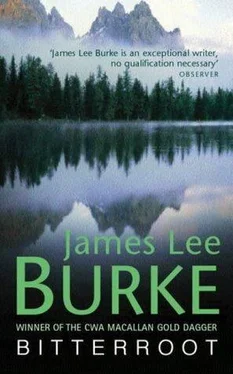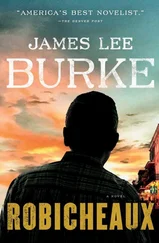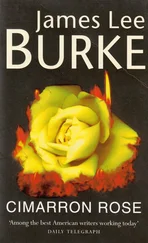"She's buds with Ellison's motorcycle pals, Maisey," I said.
"What do you know?" Sue Lynn said.
"I think you're here for self-serving reasons," I said.
"Then sit on this," she replied, and raised her middle finger at me.
She tried to stare me down, then her eyes broke. She hurried out the far bedroom door into the living room and kept going, through the front screen and down the slope toward the riverbank. I went after her.
"Listen to me," I said. "I used to be a lawman. I think the G put you inside the Berdoo Jesters. You know who set fire to Ellison, don't you?"
She was standing in the shade of the trees, and her dark skin was freckled with the sunlight that shone through the canopy.
"You should have kept the doctor away from Lamar in the bar up at Lincoln. You wouldn't listen to me. This is all on you," she said.
"What's your last name?"
"Big Medicine."
"You're a Crow?" I said.
"How did you know that?" she said.
"One of the scouts for Custer at the Little Big Horn was a Crow Indian named Big Medicine. The scouts wanted to sing their death song before they rode into Sitting Bull's village. Custer accused them of cowardice and fired them. They were the only survivors of the massacre."
She began backing toward her automobile, her eyes fixed uncertainly on mine, as though I possessed omniscience or some form of magic. Even though the air was cool in the shade, there was a bright chain of sweat around her throat.
"The car belongs to a stock-car driver. It doesn't have lights. I have to get it back to the junkyard before sunset," she said.
"Wyatt Dixon is a dangerous man. Don't let those federal guys use you."
She felt behind her for the handle on the car door, then a moment of resolve, perhaps even cautious trust, seemed to form in her face.
"Say I do know some government fucks? Why would they be asking me if Lamar and the others have been in Kingman, Arizona?" she said.
"The men who blew up the Alfred P. Murrah Building in Oklahoma City hung around there at one time or another," I said.
Her lips moved silently, as though she were repeating the words to herself, as though the enormity of their connotation would not come into focus behind her eyes.
An attorney friend of Doc's filed a pro hac vice petition on my behalf, which would empower me to represent Doc on a one-case basis without passing the Montana bar exam. On Tuesday afternoon Doc was released from the county jail on a two-hundred-thousand-dollar bond.
When we walked outside the sun was shining on the hills and the air smelled of freshly mowed grass and raindrops striking on warm cement.
"How about I buy you a dinner?" I said.
"Where's Maisey?"
"At the house."
"She didn't want to come with you?"
"I don't know much about these things, Doc, but I think rape is like theft of the soul. You've got to give her some time."
"Sure," he said, his eyes averted, his face empty. "Let's get some dinner."
THAT EVENING, at a university gathering, Xavier Girard gave a reading from his newest novel, one that some believed might win him his third Edgar Award. Students and faculty and local writers filled the room. Sitting in the middle of the audience was a man in skintight jeans and cowboy boots and a long-sleeve polka dot shirt buttoned at the wrists. He wore women's purple garters on his upper arms. He did not remove his wide-brim hat, even though the people behind him kept clearing their throats and leaning to the side to see around him.
He had arrived early, with an effeminate, longhaired youth whose smirk at his surroundings and flaccid muscle tone and lack of posture were in exact contrast to the hatted man's obvious physical power and lantern-jawed concentration.
The audience loved Xavier Girard. He was generous in spirit and irreverent toward stuffiness and convention. He was egalitarian and humble and acutely aware of propriety and language in the presence of women. He wore his own success and fame like a loose garment, and at signings charged books on his own account when a student or clergy person could not afford one. If he drank too much from the thermos of cold vodka by his elbow, his sin was a forgivable one, the alcoholic flush on his face a mask for the pain that only a poet felt.
His mouth was slightly bruised, his lip still puffed from his fight with Lamar Ellison, but his voice resonated through the room. He read the dialogue of his characters in peckerwood and Cajun accents; his eyes seemed to look directly at every one of his listeners, the iambic cadence of his descriptive passages like lines from a sonnet.
But when his eyes fell on Wyatt Dixon's, they held there, narrowing, the way a hunter's might when he sees an unexpected presence in a woods and realizes the nature of the game has just changed.
During the question and answer period that followed the reading, Wyatt Dixon's square, callus-edged hand floated into the air.
"Yes, sir?" Xavier said.
Dixon stood and removed his hat. "You, sir, are obviously a great writer and believer in the land of the free and home of the brave," he said. "In that spirit, can you tell me what is wrong with Americans running a gold mine on the Blackfoot River and providing jobs for other Americans?"
The room was silent. A couple of people turned and looked in Dixon's direction, then glanced away.
"We don't need cyanide in the river. Does that answer your question?" Xavier said.
"It surely does. I'm glad that's been explained to me. Thank you very much, sir," Dixon said. "Sir, could I ask you-"
A woman librarian picked up the microphone from the podium and, her lips brushing against the mike's surface, hurriedly said, "Mr. Girard will be signing books at the table in the back. In the meantime, everyone can help himself to the punch."
After the line had thinned out at the refreshment table, Wyatt Dixon and his young friend filled their cups. Except Dixon did not drink his. He smelled it, inhaling the strawberry bouquet and seltzer water approvingly. Then he removed his hat and dipped his pocket comb into the bowl and combed his hair in a wall mirror.
While people stared at him openmouthed, he fitted his hat back on and got in the line for a signed book.
"Just make it out to my friend Carl Hinkel, a Virginia gentleman and patriot," Dixon said.
"I can't do that," Xavier said.
"I can see you are a man of your convictions. Just sign your name and I will treasure it always. Sir, I'd also like to shake your hand."
Xavier rose and placed his hand inside Dixon's.
"It was good of you to be here. But you shouldn't try to jerk people around," he said, then his mouth stiffened involuntarily when Dixon began to squeeze.
"Lamar Ellison and me shared the same house inside Quentin," Dixon said. He continued to grin, his vacuous eyes staring into Xavier's. "On the West Coast, people inside call a cell a 'house.' You don't know that, 'cause you ain't never been inside. So that ain't to be held against you. But you might brush up on the details for your next book."
"Let go of my hand," Xavier said, his words spaced out, as he tried to retain any dignity the situation would allow him.
"You didn't set fire to my bunkie, did you, Mr. Girard? Just 'cause he busted out a window in your car and laid open your lip? You can't do that to a Berdoo Jester, sir," Dixon said, his hand catching fresh purchase.
The blood had drained out of Xavier's face. He felt with his other hand for a weapon, for the thermos on the book table, but Dixon pulled him forward, off balance.
"I don't mean to mock you, sir, but for a man who has just warmed up all these women's secret parts, your eloquent vocabulary has flown like a flock of shit birds off a manure wagon," Dixon said.
Xavier's knees were buckling now, tears running without shame down his cheeks.
Читать дальше












